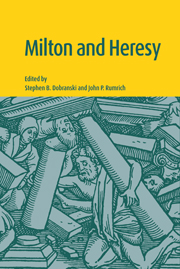Book contents
- Frontmatter
- Contents
- List of contributors
- Acknowledgments
- Abbreviations
- Introduction: Heretical Milton
- PART I HERETICAL THEOLOGY
- PART II HERESY AND CONSEQUENCES
- PART III HERESY AND COMMUNITY
- 7 Licensing Milton's heresy
- 8 Milton and the rationale of insulting
- 9 Treason against God and state: blasphemy in Milton's culture and Paradise Lost
- 10 The politics of performance in the inner theater: Samson Agonistes as closet drama
- PART IV READERS OF HERESY
- Index
7 - Licensing Milton's heresy
Published online by Cambridge University Press: 10 October 2009
- Frontmatter
- Contents
- List of contributors
- Acknowledgments
- Abbreviations
- Introduction: Heretical Milton
- PART I HERETICAL THEOLOGY
- PART II HERESY AND CONSEQUENCES
- PART III HERESY AND COMMUNITY
- 7 Licensing Milton's heresy
- 8 Milton and the rationale of insulting
- 9 Treason against God and state: blasphemy in Milton's culture and Paradise Lost
- 10 The politics of performance in the inner theater: Samson Agonistes as closet drama
- PART IV READERS OF HERESY
- Index
Summary
The only completely consistent people are the dead.
Aldous HuxleyIn Areopagitica, Milton singles out “books of controversie in Religion” as among the most dangerous because they spread an “infection” “most and soonest catching to the learned, from whom to the common people what ever is hereticall or dissolute may quickly be convey'd” (CP II: 519, 520). Milton's larger point is that Parliament's inability to extirpate such books – “likeliest to taint both life and doctrine” (CP II: 520) – demonstrates the futility of trying to enforce pre-publication licensing. He could not have anticipated that five years later as Secretary for Foreign Languages he would himself hold the post of licenser and be involved in the suppression of a “book of controversie in Religion,” the heretical Racovian Catechism, whose antitrinitarianism was the focus of religious controversy during the late seventeenth century.
Biographers have taken pains to explain away such inconsistencies and reconcile Milton's argument against licensing in Areopagitica with his censorial duties as secretary under the Commonwealth. David Masson assures us that he can provide “an easy explanation, which will save Milton's consistency”: he emphasizes Milton's “more honourable” responsibilities and downplays his licensing of a government newsbook, Mercurius Politicus, as merely a “friendly superintendence.” William Riley Parker is equally “confident that Milton's activities as licenser of a newsletter were altogether perfunctory,” and Christopher Hill infers from Milton's apparent refusal to suppress The Racovian Catechism that the author's “service to the republic … seems to have been selective.”
- Type
- Chapter
- Information
- Milton and Heresy , pp. 139 - 158Publisher: Cambridge University PressPrint publication year: 1998
- 10
- Cited by

